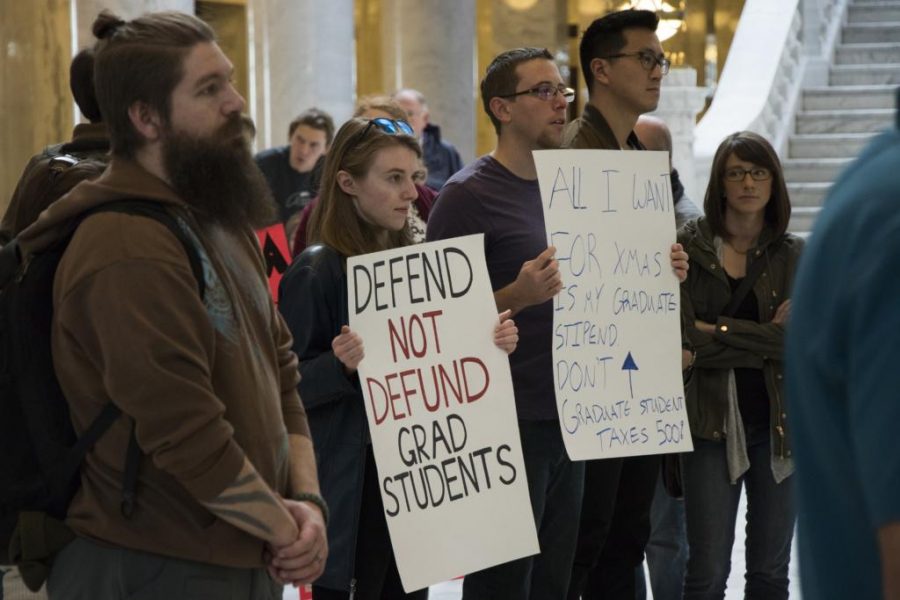University of Utah students were among those gathered in the rotunda of the Utah State Capitol on Tuesday for the Graduate Rally Against Taxing Tuition.
In response to the tax reform bill recently passed by the House of Representatives, graduate students came from across the state to make their voices heard. The new bill would include tuition waivers as taxable income — taxes students fear they would have to pay on income they never actually see.
At 2 p.m., Rebecca Richards-Steed, who is a third-year doctoral student at the U, stood at the top of the stairs with her daughter, welcoming people to the protest.
“If it passes and our waivers are able to be taxed, that is coming directly out of my pocket, essentially,” Richards-Steed said.
Dave Kieda, who is the dean of the graduate school at the U, estimated that the new bill could increase taxes on graduate students by up to 183 percent.
A podium stood in the rotunda, surrounded by sculptures representing arts and education, science and technology, immigration and settlement and land and community. Students, professors and Salt Lake County Mayor Ben McAdams stood up to speak. Many of the speakers shared experiences and family stories of how graduate students are already living off of next to nothing.
Darnell Crandall pursued a Juris Doctorate at the U’s law school. He said his parents told him, “If I work hard, if I had a little bit of faith, and kind of believed in myself, that I could make a difference, that I could give back. I could make my dreams come true.”
Many students expressed feelings of losing hope in their dreams as avenues for funding their educations close.
“If universities try to make up for that by paying us more, that means that less students will get into graduate school,” said Richards-Steed. “They won’t have enough funding to cover all of the students that are applying and wanting to go in. Ultimately, this will affect us on multiple levels in that it will affect our economy, it will affect our progress in technology and innovation, because that means we’ve got less scientists, technologists, out in the field because we won’t be able to afford to go through graduate school. You could even argue that this will impact future leadership in the United States. Lots of our best leaders have had graduate-level educations.”
This tax plan would further inhibit and intimidate students from going to graduate school, argued protesters.
“The only way that I can go to get a Ph.D. is because Ph.D. students are funded so well by a lot of universities,” said Jennifer Thorup, a third-year graduate student at Brigham Young University who is now applying to Ph.D. programs. “With the funding now going to be considered ‘income,’ to now have that be a taxable thing, I just don’t think I’m going to be making enough and be able to do the research I need to be doing at the same time to be able to even get by.”
Ending the rally, McAdams stepped up to share his thoughts on the issue.
“It’s disappointing and really a setback to see the actions that our congress has taken this week to eliminate, and really to tax, place a higher tax on your tuition,” said McAdams. “That will make it harder for you to pull yourself ahead and to get ahead and to be successful in life. Tax reform in this country is long overdue and simplifying the tax code and providing tax relief to Utah families and their businesses, that’s necessary and that’s important, and we want that to happen. But the bill that was passed in congress last week is a mess. Not only is it a mess for college students in Utah like you, but it’s a mess for hundreds of thousands of Utahns as well as the majority of Americans that will see their taxes go up.”
The protesters encouraged Utahns to contact Sens. Orrin Hatch, Mike Lee and local representatives to push back against the bill.
“Utahns like you rely on our elected officials to stand up for them on capitol hill, that did not happen last week,” said McAdams.
@kenzomcd


